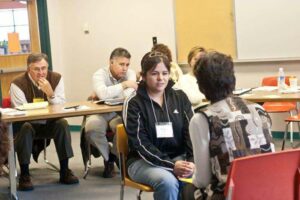Amphi’s Touch Point connects students, mentors
Originally published on April 7, 2010 in The Explorer newspaper
In this frenetic world, people rush around each day, trying to take care of a long list of challenges. They create agendas for themselves, co-workers, friends – and sometimes a son or daughter.
The result for many teens: in an overwhelmed state, some simply shut down, not knowing what to do next or which direction to go.
Enter the fledgling Touch Point Connection program at Amphitheater High School. It has well- trained “success coaches” working one-on-one with students, helping them eventually — as founder Joan Martin puts it — to be “masters of their own lives.”
“The success coach is the only person who likely doesn’t have an ‘agenda’ for students,” Martin said. “Coaching gets teens ignited about ‘what could be.’ Coaches are a natural approach since no one in this world does anything alone.”
Whether from “good” homes or troubled situations, teens often can be pressured by life’s challenges – and have a difficult time moving forward. Disinterested teens can become high school dropouts.
If that happens, the statistics are stark: 45 percent in Arizona never finish high school. One of the state’s average two-child family will not finish high school. Each dropout (about half of them never hold a job) costs the social welfare system an estimated $260,000 over their lifetime. Should drugs or crime enter the situation, each person can cost society between $1.7 million and $2.4 million in a lifetime.
Supportive success coaches work with Amphi student participants to accomplish three goals: 1) improve school attendance, 2) get better grades and 3) be less likely to be disruptive in the classroom.
Amphi counselor Sandy Spiewak offers an analysis of the pilot program, which began at the school in November 2008.
“There definitely is improvement among our student participants,” Spiewak said. “The most important part of the program is the supportive connection with kids – accepting each one as they are and just listening to them. My wish is that every student could have a success coach.”

Right now, there’s a waiting list of Amphi freshmen through seniors signed up to be part of the program.
So how does it happen? “Helping teens reframe past situations (i.e., ‘How could you have dealt with the situation differently?’) is a huge factor, said Martin. Three other vital keys are caring and believing in teens, giving them “permission” to make their own decisions, and celebrating successes with them. Traditional counseling is not part of the program, she emphasized.
During the 2009-’10 school year, 60 Amphi teens have been involved with 40 active-roster volunteer coaches. A small cadre of certified coach mentors help the adult volunteers on a regular basis. There’s also a required two-hour “refresher” workshop each month for volunteers.
Teens sign renewable three-month contracts. The success coach and teen can meet weekly in a one-hour confidential session at school only during the school year. With the obvious goal of higher education, Martin says, “We intend to ‘follow’ the teens for at least a couple of years after graduation.”
Spiewak says volunteer coaches are “unbelievable, quality people from all walks of life.” She adds the coaches are “extremely well-trained.”
“You just have to be curious (about the teen) – and patient,” said volunteer Arthur Goldberg, retired internal medicine doctor from Philadelphia. “In one year, I saw a teen become a young man. He blossomed … he talked.”
Volunteer Jane Stash, an IT business representative at Raytheon, gets satisfaction from “watching teens make better choices. They learn to succeed on their own.” Stash is a married, empty-nest mom of a daughter now in law school and a college-age son.
The program works for participating teens.
“My coach listens to me and doesn’t judge,” said senior Erika Florez. “I can focus better now.” “My coach helps me ‘keep my head up’,” said freshman Joel Valenzeula.
“My coach understands my struggles,” said freshman Destiny Cotton. “I’m not as frustrated as I used to be.”
The 57-year-old Martin got involved in educational reform in 1993 after many years as a management consultant. The Toledo native devised the success coach/teen program four years ago after a Seattle client commented, “I wish our kids could have a coach to help them.” That was the start of a similar two-year program in Seattle.
For adults interested in possibly becoming a success coach, a one-hour informational session will be held April 7, beginning at 6:30 p.m., at Every Voice in Action office, 2851 N. Country Club Road. Call 616-2960 to sign up. A few weeks later, an orientation/training session also is scheduled.
Touch Point Connection relies heavily on volunteers because it has raised $90,000 of a hoped-for $200,000 yearly budget, according to Martin.
“Being involved with Touch Point Connection has been one of the highlights of my life,” added Goldberg. “Before retiring, I used to tell people what to do. Now it’s completely different — and very rewarding.”


